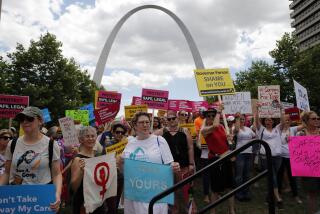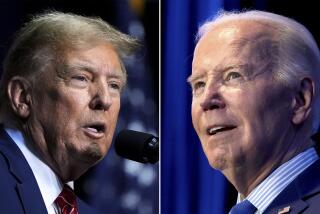Cost high, interest low in Missouri presidential primary
Reporting from Washington — Missouri Secretary of State Robin Carnahan is not thrilled about the prospect of spending $7 million on a meaningless beauty contest.
But that’s the situation the state finds itself in, after Show-Me State Republicans opted to award their delegates based on a March party-run caucus instead of the Feb. 7 state-funded primary.
“It’s a bad idea for all kinds of reasons,” Carnahan said in an interview Monday in Washington, where she is attending a meeting of the National Assn. of Secretaries of State. “Not only is it wasting taxpayer money but it’s not encouraging people to get out there and be active, which I think all of us want to do.”
Four years ago, when Missouri’s primary fell on “Super Tuesday,” 1.4 million people voted as each party saw a contested nomination race.
“I don’t think that’s going to happen this year,” Carnahan, a Democrat, predicted.
New rules passed by the Republican National Committee in 2008 stipulate that any state holding a nominating contest sooner than March 6 would see the size of its delegation cut in half.
The Missouri Legislature considered, but ultimately failed to pass legislation that would have moved the presidential preference primary from February into March. So the state GOP opted for March 17 caucuses to preserve its 52-member delegation.
An official from the Republican National Committee who addressed the secretaries of state here Monday said their rules had been a success because they discouraged the “front-loading” of the nomination fight that was seen in 2008. Then, 26 states had binding primaries or caucuses by the end of February. This year, there are just six.
That’s of no solace to Carnahan, at a time when her state faces a $500-million budget shortfall.
“My view is that if you have an election it ought to matter,” she said. “It’s just unfortunate that this year one of the parties -- under pressure from the national leaders -- have chosen to ignore the results that voters come up with.”
The candidates themselves have shown little interest in campaigning in Missouri, though Rick Santorum was on the ground Monday. Of the 10 Republicans whose name will appear on the ballot, five have already dropped out of the race, and two more are relative unknowns.Newt Gingrich, one of the four major Republican candidates left, did not even file to appear on the ballot.
While Santorum jumps ahead, Gingrich and front-runner Mitt Romney remain in Florida -- a state that chose to flout the RNC rules and move up in the calendar.
michael.memoli@latimes.com
twitter.com/mikememoli
More to Read
Sign up for Essential California
The most important California stories and recommendations in your inbox every morning.
You may occasionally receive promotional content from the Los Angeles Times.











